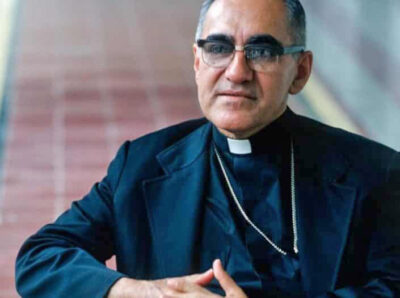Rome, 10/22/2018
The Neocatechumenal Way continues celebrating the recent canonization of Pablo VI, Óscar Romero and 5 other saints last October 14. Afew days ago we remembered the relationship between St. Pablo VI and the Way, this time we do it with St. Óscar Romero.

The miracle that has allowed the former archbishop of San Salvador to be canonized has occurred precisely in a family belonging to the Neocatechumenal Way.
In various interviews granted these days, the media tells how everything happened. In a interview in the Avvenire newspaper, the husband, Alejandro Rivas, 42 years old, says that “when I saw my wife Cecilia, affected by a rare disease ,called Hellp syndrome, who was lying down and motionless, her body punctured by 14 tubes, I understood that I had lost her.” “The same specialist had admitted that there was nothing to be done.”
It was Rivas who in a long night after seeing Cecilia lose her life, went to Monsignor Romero. “It was two in the morning and I couldn’t sleep. By chance I found my grandmother Rebecca’s Bible and, between the pages there was a photo of Romero. She was very devoted to him. When I was a child, she always spoke about him. Then, unfortunately, the lies about him as the “guerilla archbishop” with which they hammered my generation, they created an unconscious prejudice against him which we believed. In practice I have started to discover more about this great Salvadoran after the beatification.”
That night, Alejandro remembered the words of his grandmother. “So I prayed”: ‘I know you loved very much the Salvadorans. Please, now, intercede for Cecilia. ’”
The next morning, when Alejandro returned to the hospital, discovered that the internal organs of his wife had begun to give small signs of operation. One week later, the woman, out of danger, was discharged.
San Óscar Romero, expressed his appreciation for the Neocatechumenal Way in El Salvador, in a convivience of Neocatechumenal catechists and community leaders at the Rinaldi Institute, in November 1979, four months before being killed. In the homily he gave when presiding over the Eucharist, he recalled that one of the essential contributions of the Council Vatican II “is to give the Catechumenate its position of honor that it always had in evangelization.”
In turn, he saw the Catechumenate as a key instrument to prepare “that following of Christ”, because “many of us were baptized and perhaps have lived without having heard the Kerigma and we have our Baptism but as in a pagan life, it is necessary and urgent to supply that call that was not felt before and that now with a Catechumenate well done, becomes the true encounter with Christ”.
“We are not going to deny this sad reality of all those baptized who have not heard the Kerigma, baptized only by a rite, by a custom, “he said.
“I think that in the Catechumenal movement, this desire being given perfectly, which is to supply that announcement of the Gospel that we had not given its due attention, along with a training, already systematic, which is the Catechesis.”, he said then.
In that celebration, the now saint, also spoke of the importance of the Way to revitalize the catechesis and the sacraments: “You are very valuable elements, in the parishes (…), so that they can revitalize a whole Catechesis that does not consist solely of reflecting, learning from memory, but in a Catechesis that guides the Sacrament and some Sacraments received with full conscience, with respect, with worship of the Lord found in those sacramental signs. There cannot be, then, simply evangelization and, as was said before, sacramentalization, but both; true evangelization leads us to meet Christ in the sign of the Church and its sacraments.”
Finally, he expressed the wish that the Way take the catechumenate to all the parishes to illuminate the life of men: “I urge you and ask you with all my heart as Pastor, wherever you go to the parishes where you are living and reaching out, try to bring the Catechumenate.”